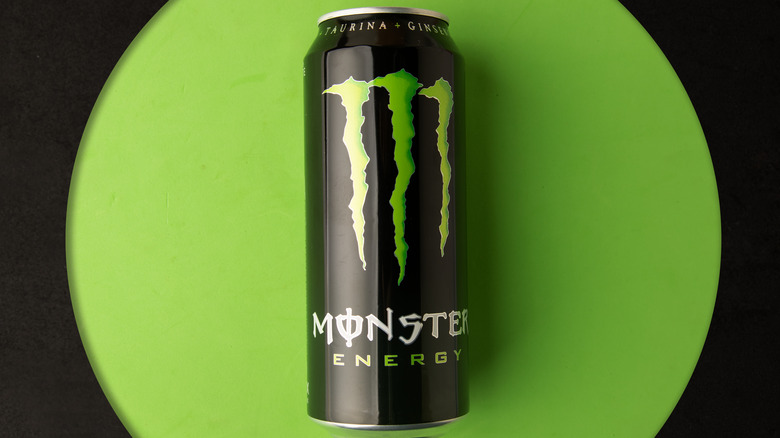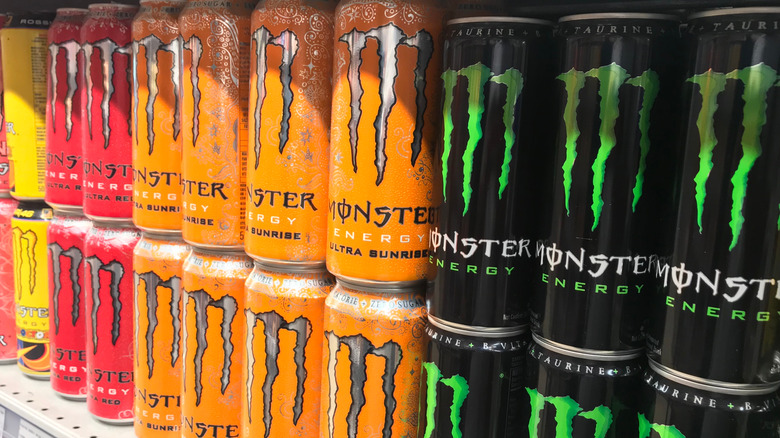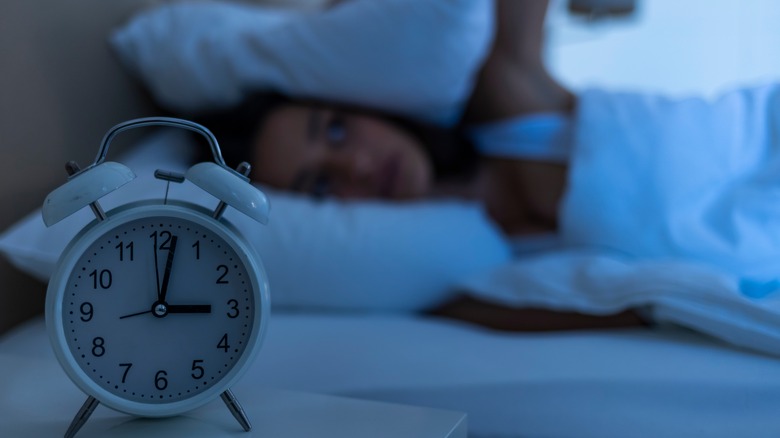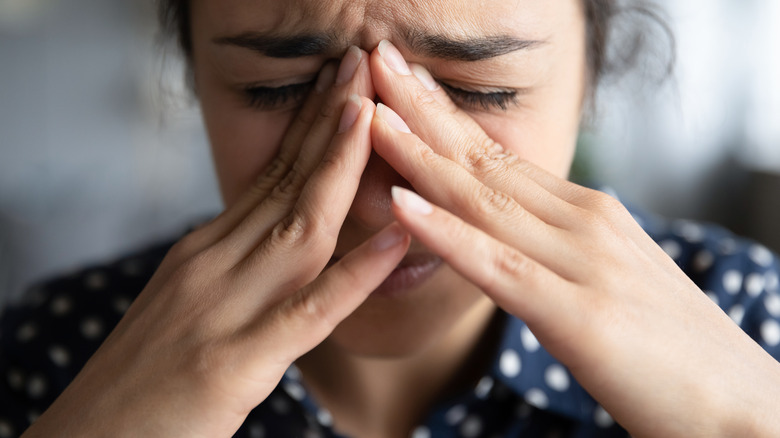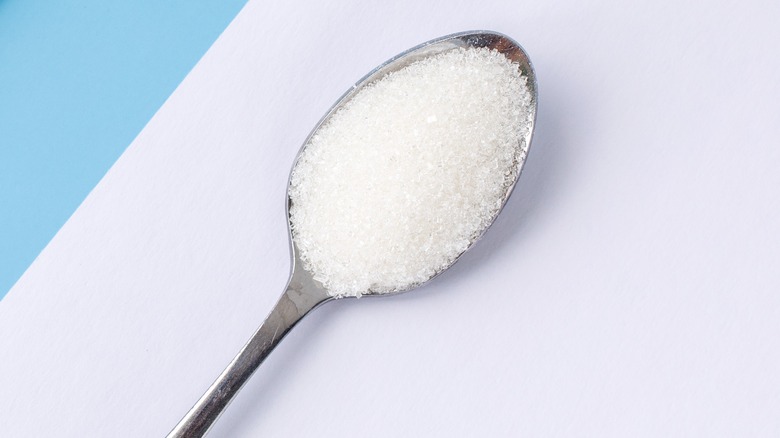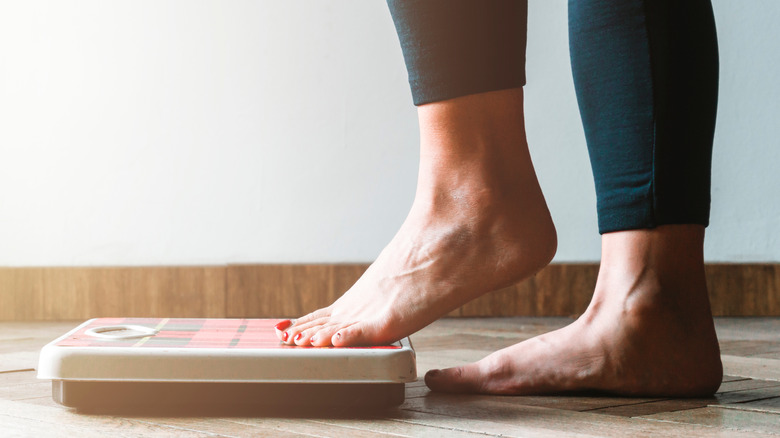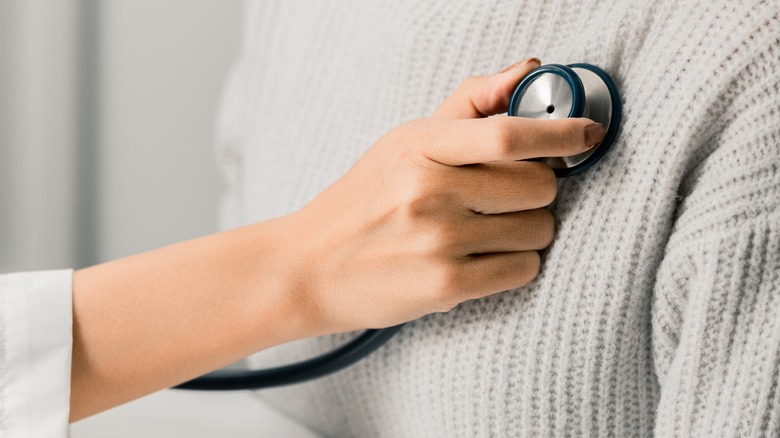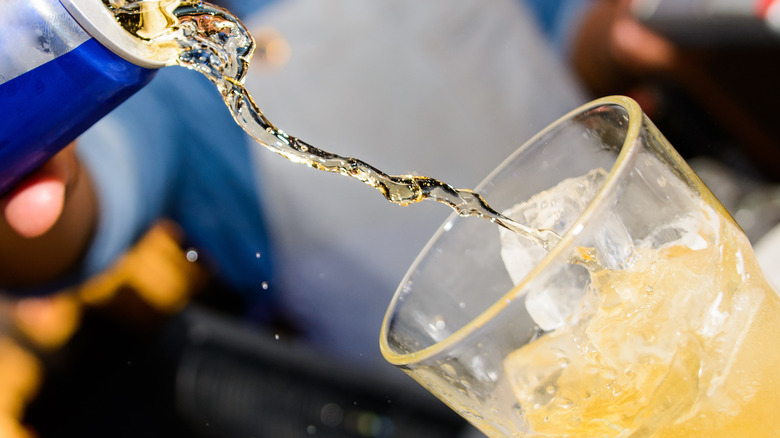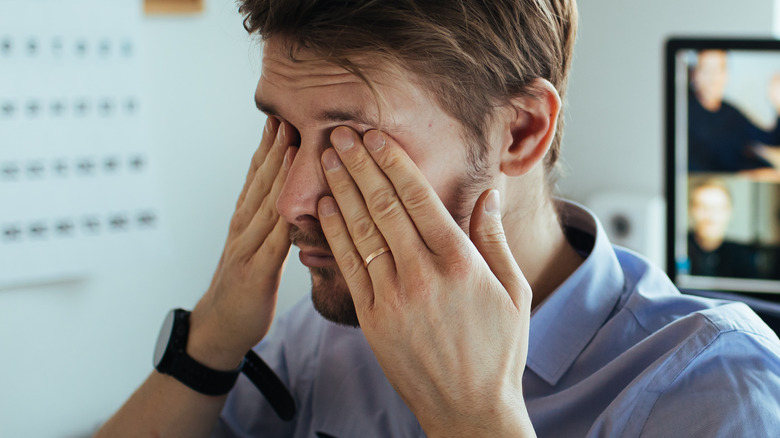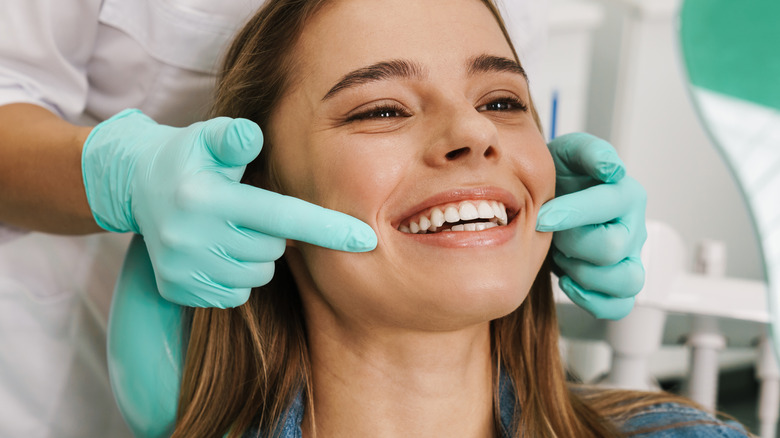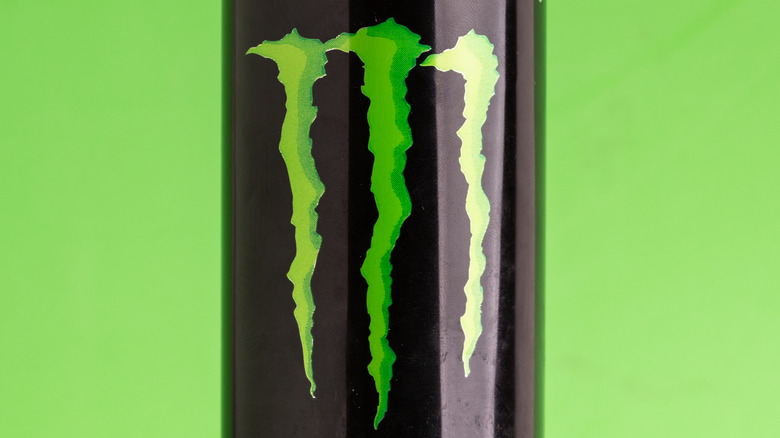Are Monster Energy Drinks Bad For You?
Monster Energy — the name of the product pretty much says it all. Packed with caffeine, sugar, and some supplemental vitamins and minerals, this is a beverage that's all about giving you a major rush to help you get through the day when you're just not feeling it. But is something as extreme as this kind of energy drink actually good for you?
Maybe you've heard some words of caution from people who have seen you sipping a can, or maybe you just have a nagging voice in the back of your head telling you that something that propels you like this can't be safe. Is Monster Energy really bad for you? And if so...well, how bad?
Like most products out there, Monster Energy is something you'll want to consume in moderation. If you go too heavy and too hard, you could find yourself faced with numerous health risks, both in the long term and short term. Here's what you should know when it comes to whether Monster Energy is bad for you.
Ingredients and nutritional facts about Monster Energy drinks
The thing about the word "bad" when it comes to any sort of food or drink is that it's all relative. Any product out there on the market could have health benefits for you while also having some drawbacks. That's why it's so important to look at the ingredients and Nutrition Facts panel to make an informed choice for yourself.
When you pull up the official website of Monster Energy, it pitches its original drink as having the "ideal combo of the right ingredients" so that you get the oomph you need to push you through the day. The problem? Well, Monster Energy doesn't actually list those ingredients on its site. It doesn't even mention how many calories it has or its specific caffeine content.
Fortunately, other online sources (such as the grocer H-E-B) have that information readily available. A 16-ounce can of Monster Energy has 210 calories, all of which come from carbohydrates in the form of sugar. Monster Energy does have some nutrients, primarily 200% of your daily value of Vitamins B12, B2, B3, and B6. According to Caffeine Informer, Monster Energy has about 160 milligrams of caffeine per 16 ounces, which it ranks as "very high." Still, that's not as much as coffee — a 16-ounce cup of Dunkin brew has about 240 milligrams (via Caffeine Informer).
Monster Energy's caffeine content can help you concentrate
As long as you don't overdo it, caffeine can be good for you. The emphasis there, of course, is on not overdoing it.
Today reports that a moderate amount of caffeine (about 300 milligrams, or nearly two times what you would get in a can of Monster Energy) consumed once a day will be effective in providing mental alertness and improved concentration. There's a good reason for that: Caffeine goes into your brain cells, which are formally known as neurons. However, it's important to keep in mind that just because caffeine makes it easier for you to concentrate and focus, doesn't necessarily mean it will improve your ability to retain information or make you smarter. That part of learning is still on you.
But it's not just about mental energy. A moderate amount of caffeine is also good for making you better at physical activity. Caffeine makes it easier for your body to tap into fat as a source of energy rather than carbohydrates, ultimately improving your endurance (that is, your body's ability to exert itself for an extended period of time).
But long-term consumption could disturb your sleep
The other reason the caffeine in Monster Energy can help keep you alert? Well, caffeine stops your brain from creating a chemical called adenosine, which is what promotes feelings of sleepiness, according to the Sleep Foundation. That's great when you're trying to stay awake — but when you're trying to sleep, of course, that means trouble.
The problem is that your buzz from Monster Energy will last a little bit longer than you sleep. Caffeine has a half-life of four to six hours, so even one can in the afternoon could still be lingering in your body well into the evening. This will mess with your body's natural sleep-wake cycle, so you don't start feeling tired at night the way a healthy person would.
Your best bet is to monitor your caffeine consumption and don't drink a Monster Energy drink (or any caffeinated beverage) within six hours of bedtime. If you have trouble sleeping, or if you feel tired the next day after a reasonable number of hours of sleep, consider cutting back on your caffeine.
Too much caffeine can cause anxiety
There's another reason that blocking those sleep chemicals in your brain could be a problem — even if you're drinking Monster Energy way before you need to go to bed. Prevention explains that blocking these sleep chemicals charges up your central nervous system. That's when your central nervous system starts producing hormones like adrenaline and dopamine. Suddenly, your body isn't just ready to stay awake; it's read to fend off trouble or make a sudden escape if you need to.
Stimulants like caffeine will also increase bodily systems like blood flow and heart rate. That's great if you need to expend a lot of energy. But if your blood is flowing, your heart is pumping, and your nervous system is racing, and you have no release — well, that results in a lot of anxiety. You could potentially even be looking at giving yourself a panic attack.
Now, before you worry, bear in mind that all of this is a result of excess caffeine consumption, something the Food and Drug Administration quantifies as more than 400 milligrams. If you're sticking to a 160-milligram can of Monster Energy, you should be all right.
Monster Energy has a lot of sugar, and that's bad for diabetics
Concerns about Monster Energy are about much more than simply caffeine, though. Remember that this drink derives all of its calories from sugar — and too much sugar can be a bad thing.
The American Heart Association recommends that men and women limit themselves to 36 grams and 25 grams of added sugar a day, respectively. When you consider the fact that a can of Monster Energy has 27 grams of sugar, you've already exceeded your daily sugar amount if you're a woman, and you're less than 10 grams away from exceeding it if you're a man.
Watching your sugar intake is especially important because high sugar consumption can lead to type 2 diabetes. Once a person develops diabetes or prediabetes, they'll have to be extra careful to monitor their sugar consumption. That's because a person with diabetes isn't able to process sugar as efficiently as somebody without diabetes. This creates spikes in blood glucose, which can cause bodily damage and health complications (via Medical News Today).
Sugar-packed drinks can also make you gain weight
It's not just diabetes that's a concern when you're looking at excess amounts of sugar consumption. The Centers for Disease Control and Prevention explains that too much sugar can lead to weight gain and obesity, among other health risks.
Why is this so important regarding Monster Energy? That's because consumers shouldn't be fooled into thinking that excess sugar is all about candy and confectionary. As the CDC points out, the biggest source of added sugar in the American diet is sugar-sweetened beverages. That includes the usual culprits like soda and sweetened coffee, but it's also true of energy drinks like Monster Energy.
Per the CDC, it's not just the sugary drinks themselves that are bad. People who drink a lot of sweetened beverages often have other bad habits, too, such as poor sleep or poor diet. They also have a tendency to have more screen time. If you're counting on Monster Energy as a boost to get you through the day, it wouldn't hurt to look at your other habits — cutting back on screen time to get a few extra hours of sleep might mean that you don't need the sugary caffeine fix you think you think you do.
You can take your chances when it comes to heart health
Monster Energy might be a plus or a minus when it comes to heart health — expert opinions go both ways.
Remember how caffeine can increase your heart rate and blood flow, causing problems like anxiety and panic attacks? Well, it's not just your mental health that's affected by an increased heart rate. It probably comes as no surprise that this could be bad for your physical health, too — and the American Heart Association says that there have been plenty of studies looking at whether caffeine increases your risk of heart disease. Here's the problem: There's too much conflicting evidence, so nobody knows for sure.
On the other hand, the American College of Cardiology is willing to state that it doesn't see caffeine posing a huge risk as far as heart health goes. It cites a study where test subjects consumed up to 500 milligrams of caffeine over the course of a day and did not suffer from abnormal heart rhythms. The bigger concern is for people who are already at risk for abnormal heart rhythm — and those individuals should be careful about their caffeine consumption. People with no heart problems should be safe enjoying moderate amounts of caffeine, such as the amount found in a can of Monster Energy.
Energy drinks can be dangerous in combination with alcohol
Whatever you do, you shouldn't be mixing Monster Energy with alcohol, per the advice of the Centers for Disease Control and Prevention. Although this combo is popular among middle schoolers, high schoolers, and young adults, it can make drinking an even riskier activity for these demographics that are already vulnerable.
There's a popular misconception that caffeine can increase the speed at which your body processes alcohol, so you can sober up more quickly if you need to. This is not the case. All the caffeine does is make a person who is consuming alcohol feel more alert, so they are unaware of the way the alcohol is impairing them. These drinkers might then feel compelled to drink more alcohol or even undertake activities that they shouldn't do when they're drunk (like driving a car).
In fact, the CDC goes on to explain that beverage manufacturers used to produce premixed caffeinated alcoholic drinks that were marketed toward young people, but when the Food and Drug Administration deemed these drinks not to be generally recognized as safe, they were pulled from the market.
Monster products are especially bad for children and teens
If you've ever looked at a young person and thought that they didn't need caffeine because they naturally seemed like a bundle of energy — well, you might be onto something.
Monster Energy and other highly caffeinated products are especially risky for young people, according to the Seattle Children's Hospital. Despite what safe amounts might be recommended for adults, children and teenagers shouldn't be getting more than 100 milligrams of caffeine a day (about one-fourth of the recommended amount for adults). That's less than what's found in a can of Monster Energy!
If you look at the label for Monster Energy, you might even notice that the label says it is not recommended for children or other people who could be especially sensitive to caffeine. The hospital illustrates this by pointing out the case of a 14-year-old who drank 48 ounces of Monster Energy in a 24-hour period and suffered cardiac arrhythmia because of the high dose of caffeine (note that this teenager also had an underlying condition). Although this tragedy is not a common circumstance, large amounts of caffeine should not be made available to children.
The caffeine in Monster Energy can cause you to become dependent
Consider this: You drink a can of Monster Energy every single day. Maybe you start to notice that on the days when you try to go without it (or when your daily can is a few hours later than it normally would be), you start to feel a little less than your best. It might even be that Monster Energy doesn't affect you quite the same way it did when you first started drinking it — the charge isn't as strong, or you need more of it to get the same effect.
None of this is unusual, as the Cleveland Clinic explains. However, it's important to understand that this isn't a physical addiction, like the kind you would suffer if you were taking meth or ecstasy. Instead, this is what's known as dependence: Your body has come to expect the dopamine you get from consuming your daily fix of caffeine. And even though you might not suffer symptoms of withdrawal if you gave up caffeine completely, it's still never a great feeling to depend on something like an energy drink to get you through the day.
Too much caffeine can cause digestive upset
You might have had a situation where you drank too much Monster Energy and it gave you an upset stomach. That's not a coincidence.
Large amounts of caffeine can have an effect on your digestive tract, according to the University of Michigan Health. The scientific explanation behind this lies in the stimulant nature of caffeine. In the same way it stimulates your brain, caffeine will also stimulate your gut. Specifically, it makes the muscles in your gastrointestinal tract contract a little more than they usually do. When this happens, everything you're digesting moves along a little faster than normal, and you get loose stools or diarrhea. This gut upset can be worse in people who have other GI problems like irritable bowel syndrome.
There are other reasons why Monster Energy could be giving you digestive upset. High levels of added sugar could be to blame, for example, as could artificial sweeteners (if you're drinking a sugar-free energy drink).
Monster Energy can damage your teeth
The problem with a large quantity of added sugar isn't just the blood glucose crash or the weight gain. You also have to consider the way that it's affecting your teeth.
As Dr. David Cote, explains, energy drinks aren't any healthier for your teeth than other high-sugar beverages like soda are. The highly acidic nature of energy drinks makes them particularly bad for tooth enamel, setting you up for dental problems. Even more problematic is the fact that these acidic energy drinks might be taking the place of beverages like milk, which has the calcium you need to maintain strong teeth.
Based on the findings of a study in the Journal of the American Dental Association, energy drinks are notably worse for teeth compared to sports drinks (even though sports drinks can be bad for teeth as well). Energy drinks have higher pH levels and are more acidic than sports drinks, which results in greater dissolution of tooth enamel.
You could be overdoing it on the vitamins and minerals
There's one last thing you should be wary of if you're drinking a daily Monster Energy, and it actually might surprise you. That's because one of the benefits to Monster Energy could be a detriment if done in excess: the supplementary vitamins and minerals.
It's true. Even though a boost of vitamins and minerals from Monster Energy sounds healthy, moderation is still the key. GQ explains that you're better off getting your nutrients from a healthful diet full of fruits and vegetables. If you drink too many energy drinks, you could be exceeding the recommended amounts of certain nutrients.
Case in point: vitamin B6, according to the National Institutes of Health. You're unlikely to exceed the recommended amount of B6 from a food source, but if you're getting it in supplementary form, you could be setting yourself up for skin lesions, sensitivity to light, nausea, and heartburn. The NIH also notes that niacin could be another cause for concern, as excess amounts of this vitamin cause flushing, fatigue, digestive upset, and eye problems.
Moderate amounts of Monster Energy can be consumed safely
It's important to consider the health risks of too much Monster Energy seriously — after all, you don't want to be suffering from an upset digestive tract or find your entire sleep cycle thrown off. But as long as you're a generally healthy person and you are moderate and responsible in the amount of Monster Energy that you drink, you shouldn't have too much of a problem (via Healthline).
Don't drink so much Monster Energy that you're exceeding your recommended amount of daily caffeine or added sugar, and don't make a habit of drinking Monster Energy every day. It's also important to remember that if you should be avoiding caffeine for any reason — for example, if you're pregnant or if you have heart problems — you should consult with your doctor.
But for most people, if you like the taste and find that Monster Energy gives you a boost of alertness when you need it the most, then it's hard to say that Monster Energy is quote-unquote "bad" for you.

